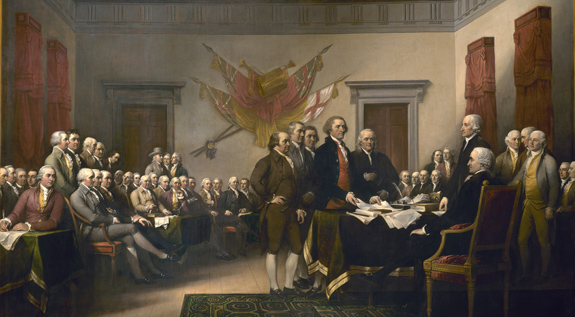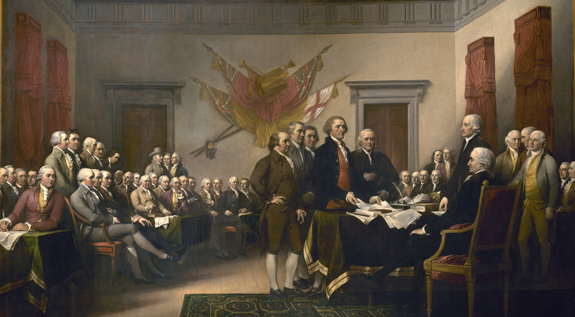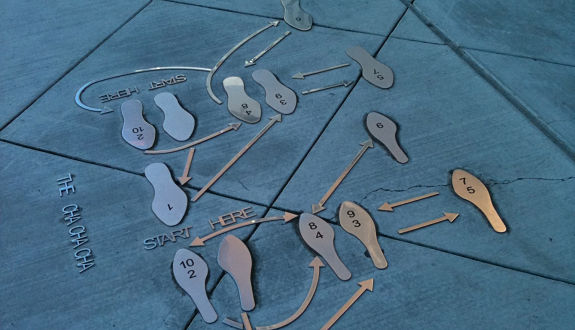What our Founding Fathers would Score on the LSAT
- by
- Jul 05, 2011
- How Would They Have Scored on the LSAT?
- Reviewed by: Matt Riley


Just like new college students, the Founding Fathers rebelled against the repressive regimes under which they grew up. They lifted arms, you lifted beers. And when it was all said and done (and the Founding Fathers finished celebrating, which probably put you to shame), with what were they left? A hangover, a few papers to write (you, a PoliSci final, them, the Articles of Confederation), and a few people they had to avoid (though ducking Sarah in Psych 101 was probably less awkward than when Franklin had to duck David Hartley in Paris).
But founding a new nation wasn’t enough, and they all decided to go to law school why not? Let’s take a look at their LSAT scores:
8) John Hancock
Johnny H, as he preferred to be called, received a 127 for signing his name. He then left. John Hancock was Governor of Massachusetts – he had more important things to do.*
7) John Jay
John Jay was the man. Seriously. He’s given short shrift in the annals of history, overshadowed by the ‘flashier’ and ‘presidential’ Founding Fathers. However, he had a treaty named after him, abolished slavery in New York, and became the first Chief Justice of the Supreme Court, where he heard 4 cases. That’s right, he demanded to be made Chief Justice (by turning down George Washington’s offer of Secretary of State – get that weak sauce out of here, George!) and then took a few years off just because he could.
John Jay’s first training was in how to learn, and he took this to Paris. He booked a room next to Franklin, not because he had a thing for bald geniuses with glasses, but rather to learn from the most experienced diplomat. This thirst for knowledge led to a vast intellect and a dedication to hard work. John Jay wracked up a 178, thus earning him the John Jay Scholarship naming rights.**
6) Alexander Hamilton
Lifelong enemy of Aaron Burr, Hamilton once used his influence to sway the electoral college towards Jefferson after Burr tied him (that’s right, Aaron Burr tied Jefferson in the presidential election). Reeling from the defeat (well, reeling in the office of VP), Burr decided to take the LSAT; Hamilton wasn’t far behind.
After months of study, Alexander Hamilton managed to score a 172 to Burr’s 169. Burr, however, would get the last laugh.
5) John Adams
John Adams once got into a month-long debate about the proper title for the president. Whether it was because he had an intense interest in the specificities of language or nothing else to do (as Washington rarely consulted him during his tenure as VP), it inspired the following Wikipedia sentence: “The pomposity of his stance, along with his being overweight, led to Adams earning the nickname ‘His Rotundity.'”
As such, I believe Adams was a gunner in law school; once a gunner, always a gunner. Adams rocked the LSAT, but scored only a 179. He’s always coming in second place…
4) James Madison
You know that whole Constitution thing everyone keeps talking about? Yea, it was this guy.
Madison recognized the problems with the Article of Confederation, was a leader in the Constitutional Convention’s initiation, and was recognized as a leader during the Convention by his peers (overshadowing Jefferson and Adams). He read books on every form of government ever tried, and was eminently prepared.
He was immeasurably smart, but I imagine he rushed a bit through some sections. I’m predicting a 176, with a personal statement that reads as follows:
“I’m sorry I didn’t score perfectly on my LSAT. I was too busy creating a modern superpower that will last for centuries.”
There was also probably a picture of him naked, standing on a bear rug.
3) Thomas Jefferson
You know why you’ve never heard of Thomas Jefferson as an inventor? Because he was too busy doing too many other awesome things that something had to fall through the cracks.
Much like Franklin, he was a Renaissance man, and damn proud of it. His mind was honed by writing some things you may have heard of, like the Declaration of Independence. However, he was a man given to dreaming, and that wandering eye (*wink*) would cost him valuable time on the LSAT. Expect a 174 from TJ, but a personal statement that would inspire men to go to their deaths for him. Because it did.
2) Benjamin Franklin
The man was quite obviously a genius in pretty much every area. Inventor, statesman, kite enthusiast; Franklin was a man of many hats. As an author, he had a command of the English language that was unmatched at the time, and as an inventor, the logic games would be walk in the park. Hell, he might have invented logic games to fill in pages of his Almanac. Good ol’ Ben received a 179. Why not a perfect score? Keep reading.
1) George Washington
Seriously? Do you even have to ask? 180. Believing anything else in treasonous. In fact, every other person who took the LSAT before George Washington tanked it on purpose to lower the curve enough for him to be the only founding father to receive a perfect score (See the election of 1820).
Yes, they all scored unbelievably well. Why? Because I’m writing this on July 4th, you communist. It’s patriotic.
So where’d they all go? Litchfield Law School. Established in 1784, it was the only game in town. Most other prestigious schools offered a course of study in law at their undergraduate institutions, giving Litchfield a monopoly on post-graduate legal education.
*I was going to leave old Johnny H out, but Kristin nailed this joke.
**There’s a quote from one of my favorite books in the John Jay entry. First to post the book wins something, possibly.
Search the Blog

Free LSAT Practice Account
Sign up for a free Blueprint LSAT account and get access to a free trial of the Self-Paced Course and a free practice LSAT with a detailed score report, mind-blowing analytics, and explanatory videos.
Learn More
Popular Posts
-
logic games Game Over: LSAC Says Farewell to Logic Games
-
General LSAT Advice How to Get a 180 on the LSAT
-
Entertainment Revisiting Elle's LSAT Journey from Legally Blonde








